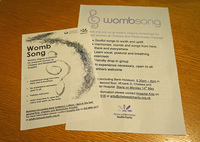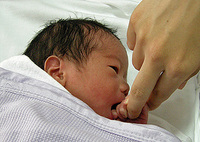English
- SINGING CLASS FOR PREGNANT WOMEN
'Womb Song' is a unique workshop delivered in a hospital in London, which offers singing lessons for pregnant women. This is not about getting a head start in music education for babies while they are still in the womb, but about the advantages of singing for pregnant women, which is beneficial for both mothers and babies during pregnancy, but also through labour and after birth. The workshop takes place in a room at the hospital with support from maternity staff.
- 名称:
- Womb Song
- 場所:
- Chelsea and Westminster Hospital, The Tent(369 Fulham Road, London SW10 9NH)
- 日時:
- Mondays, 18:30-20:00, for a six month period
- 参加:
- Free. No booking required
- 主催:
- Chelsea and Westminster Health Charity
- URL:
- http://www.chelwest.nhs.uk/about-us/news/news-archive/2012/innovative-singing-workshops
'Womb Song' takes place in a room at the Chelsea and Westminster Hospital, quite a big hospital in London. The course is run by the Chelsea and Westminster Health Charity, an auxiliary organisation of the hospital which aims to fund projects that enhance the wellbeing of patients, staff and visitors, and also awards grants to cutting edge research teams.
The charity puts lots of effort into arts and music programmes, under the 'Hospital Arts' project. It is based on the clinical facts that art and music can calm anxiety and stress, lower blood pressure, and increase the flow of endorphins and serotonin in the body. This, not only makes people in the hospital feel happier and more comfortable, but also improves the health outcome of patients and reduces the need for pain medication. The programmes include art collections on the hospital walls; classical, jazz and world music concerts; sing-along workshops for stroke and dementia patients to help improve memory and stimulate movement; and activities for paediatric patients. The Royal College of Music is one of the bodies which offer music programmes.
'Womb Song' started in 2011 as one of the 'Hospital Arts' programmes. Having run for six months from spring to autumn each year, it attracted about 120 pregnant women during 2011 and 2012. A free singing session took place for 90 minutes every Monday from 18:30 to 20:00, and didn't require prior booking, so the participants could decide whether they would attend or not, depending on their physical or mental condition. Some of the participants attended as many as 10 times from the early stage of their pregnancy, but some, like myself, were already nearly full term when it started and so could only attend a few times. The participants came and went depending on their stage of pregnancy, but about 10 people attended each class. Partners were also welcome, so some couples came together after work. There was a singing facilitator, and one of the members of staff from the charity was also present at the class.
'Womb Song' does not require any prior experience or knowledge of singing. I was a bit worried about attending the class because I hardly knew any British nursery rhymes when I was pregnant, but it turned out that there was no need, as the class was not about recollecting nursery rhymes. According to the results of a questionnaire, only around 50% of participants had had experience of singing before taking part in the project, but 93.8% in 2011 and 100% in 2012 indicated an intention to keep singing afterwards.
The session started with breathing and vocal exercises, facing each other in a big circle. The facilitator, Maya Waldman, led some exercises such as making a relaxed sound with gentle massage of the face and head; sticking out the tongue in all directions; making a buzzing sound with the lips; and moving the neck and shoulders around and arms and legs back, to relax the body, muscle and soul. Sometimes we made a higher and higher sound as we swivelled our arms upwards, and lowered our voices as we crouched low, or we breathed deeply while letting out our voice slowly as we opened our arms wide from side to side, or vocalised the rhythm of stepping forwards and backward gradually applying some words to it and repeating it as a song. In one exercise, we screwed up our faces into a frown, and then on releasing the tension in all parts of the face, we could feel how it was easier after doing the opposite movement, rather than only being told to 'open your eyes and mouth as wide as possible!'
Here, I will outline some benefits of this singing workshop. Most ante-natal classes teach pregnant women how to breathe during pregnancy and labour. However, this can make it difficult to breathe naturally because you actually think about it too much. In contrast, in these singing exercises, breathing comes together with movement, rhythm and vocalising, and then gradually leads to a song; and through singing, you can breathe and vocalise naturally. Controlling our breathing improves our singing, and singing helps us to control our breathing. The above-mentioned facial expression exercise, and the exercise that combines a high-low voice and loud-quiet voice in singing exercises makes it easier to loosen up your fixed voice range. We also practised different types of breathing, for example, Maya combined exercises of making long notes while breathing out slowly, and laughing 'Ha, ha, ha!' from the bottom of the gut. She devised many combinations of exercises according to how the participants were getting on, and according to how tired we were.
A wide range of nursery rhymes and folk songs from all over the world were sung in the workshops, so few were known to the participants. Many songs were from Africa and South America, so were sung in unfamiliar languages. Therefore, the participants had to listen to the melody and the words very carefully, phrase by phrase, in order to sing them back to Maya. We also listened to the voices of the other participants and learnt songs through singing, rather than singing familiar songs however we liked. All the songs that Maya had selected were short, simple, slow, easy to learn, repetitive, uplifting and included many open vowels and sustained notes.
Using these types of songs helped us not only to learn the songs and sing more easily during the session, but also helped to find a way to relax the subconscious reflex of the breathing mechanism, through singing open vowels and sustained notes slowly and repeatedly. Learning to relax this reflex is beneficial for pregnant women both for improved posture and for relaxation during pregnancy, and is also preparation for breathing and relaxing during labour.
According to Daisy Fancourt, Performing Arts Officer at Chelsea and Westminster Health Charity, clinically speaking, singing releases endorphins and serotonin, which make women feel happier, and these act as natural pain relief during labour. This is on top of the benefit of relaxed breathing that singing brings. Some of the participants actually found that remembering the breathing exercises and songs they had learnt in the class really helped them to have a happy and relatively easy birth. The classes also received positive support from maternity staff at the hospital.
In addition, having the support of the local hospital and having an opportunity to share this experience with other local pregnant women made the participants feel more connected to the community and to other people, and it helped them to get through the anxiety and mental imbalance some feel during pregnancy. One participant said:
"Womb Song has been highly beneficial to me as I had been going through a great deal of depression and anxiety. Womb Song was such a useful class as it helped me to release stress and kept me floating with the emotional and physical changes during pregnancy. It did not matter how low I was feeling, every time I came to the class I experienced a positive "re-charge" of energy and felt I was doing something good for me and my baby... I give a lot of credit to this practice and I am now feeling ok about facing the birth."
It is not only the mother who benefits from the singing exercises. When the mother has relief from physical and mental stress and feels relaxed and happier, the baby can subsequently enjoy a healthier life in the womb. According to Daisy, singing while the baby is in the womb can help to build a bond with the baby, and can also facilitate language development after the birth. Babies develop their organs, including ears, in the womb and by constantly hearing their mother's voice, they recognise it and distinguish it from other people's, and they develop awareness of differences in tones and sounds. It helps babies to feel relaxed when they hear it after birth, and makes it easier to start communicating with their mother by listening to the expression in their voice. The mother's partner's attendance in the class also helps to develop bonding and communication between them and the baby.
It is often said that it is important to talk to your baby both while they are still in your womb and after the birth, but there are many parents who feel uncomfortable talking to their baby when they cannot yet understand language; let alone to their unborn baby. Some of the participants actually said that they felt self-conscious about talking to their baby in the womb, but singing felt really normal. If they feel uncomfortable singing alone, group singing can help them sing more naturally.
Singing is a very early form of communication between mother and baby, both before and of course after birth. If a mother is not used to singing to her baby, it might be very difficult for her to start singing to soothe her baby for example when the baby is crying. However, if she is used to singing to her baby, she can sing naturally without any stress, and it can help her find a way to communicate with her baby. It also means that singing helps the mother to calm her own anxiety and stress and release happier hormones, and helps to build a relaxed and stable mother-baby relationship. This can be an efficient way to prevent post-natal depression.
With 100% positive feedback from the participants, the Chelsea and Westminster Health Charity is planning to start another cycle of 'Womb Song' classes for both pregnant women and new mothers, and aims to establish a national website offering resources to other women.
Report: Chigusa Futako













